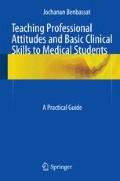Abstract
Doctors differ in their values, training, and practice setting, and eventually adopt diverse approaches to patient interviewing, data collection, and problem-solving. Consequently, medical students may encounter marked differences in the clinical methods of their tutors. For example, some doctors encourage patients’ narratives by using open-ended questions, while others favor closed-question interrogations; hospital- and community-based doctors may disagree on the value of the physical examination; and clinical tutors vary in the way they communicate clinical uncertainties to patients, colleagues, and students.
Access this chapter
Tax calculation will be finalised at checkout
Purchases are for personal use only
Author information
Authors and Affiliations
Corresponding author
Rights and permissions
Copyright information
© 2015 Springer International Publishing Switzerland
About this chapter
Cite this chapter
Benbassat, J. (2015). Introduction. In: Teaching Professional Attitudes and Basic Clinical Skills to Medical Students. Springer, Cham. https://doi.org/10.1007/978-3-319-20089-7_1
Download citation
DOI: https://doi.org/10.1007/978-3-319-20089-7_1
Published:
Publisher Name: Springer, Cham
Print ISBN: 978-3-319-20088-0
Online ISBN: 978-3-319-20089-7
eBook Packages: MedicineMedicine (R0)

